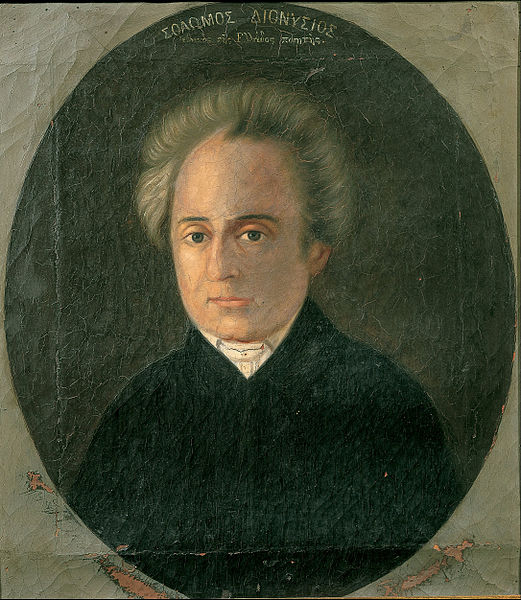Dionysios Solomos was born in April 1798 in Zkynthos, the son of Angeliki Nikli and Count Nikolaos Solomos, who died in 1807. Dionysios began his education in Zakynthos. In 1808, following the decision of his guardian, Count Dionysios Messalas, he was forced to complete his education in Italy, as was usual for young men of noble blood of his time. In November 1815, he enrolled in the Law School of the University of Padua, where among the professors were Vincenzo Monti, Ugo Foscolo, and Elia Giardini. He graduated two years later. In Italy, he came into contact with liberal European movements, heard the demands for social renewal, and experienced dimensions of classicism and romanticism.
At the age of twenty, he returned to Zakynthos, from where he followed the outbreak of the Greek Revolution. He spent a long time at the country house of his close friend Georgios De Rossi in Akrotiri, Zakynthos, at improvised poetry evenings, and in the company of writers such as Antonios Matesis (poet, dramatist), Dionysios Tagiapeiras (doctor), Spyridon Trikoupis (historian), Andreas Komiotis (member of the Society of Friends), and many others. He actively participated in the political and social life of the Ionian Islands: in honour of the death of the great Ugo Foscolo, his compatriot who ultimately became Italy’s national poet, he agreed to read in Italian Eulogy for Ugo Foscolo in the Catholic cathedral in Zakynthos. In early 1821, he participated in a ‘public act of rebellion’, co-signing a list of complaints about the constitution of 1817 and against the British commissioner, Thomas Maitland, which was addressed to King George IV of the United Kingdom. The text was confiscated before it could be finalised, and the instigators were arrested. Solomos continued to denounce the wrongs of his time through his poems (Lambros, The Displacement of the Statue of Maitland), without, however, attempting political intervention.
In 1823, Solomos met Spyridon Trikoupis. The later-famous historian helped Solomos practice his Greek, using a copy of Christopoulos’ Lyrics as a study aid. Trikoupis also promised to give Lord Byron a copy of Hymn to Liberty (1823) during his move to Mesolonghi, but Byron had died before he could. The Exodos of Mesolonghi on Palm Sunday 1826 had a great impact on the poet. The Free Besieged (1826-1851), would stay with him throughout his poetic production. The three drafts that comprise the work are inspired by the struggle of the population of Mesolonghi, who finally achieved freedom through their desire for resistance, overcoming not just starvation and hardship, but also the very temptation of the beauty of nature.
In Corfu
Solomos wanted to move to Corfu, not just because of family problems he was having in Zakynthos—he had to go through a very important court case against his half-brother, Ioannis Leondarakis—but because the capital of the Ionian Islands was their intellectual centre, a refuge that would ensure him peace and isolation. This move would bring him to the centre of a circle of poets and admirers, intellectuals, and ambassadors of liberal and progressive ideas. His circle comprised Nikolaos Mantzaros, Ioannis and Spyridon Zambelios, Ermannos Loudzis, Nicolo Tommaseo, Andreas Moustoxidis, Petros Varailas-Armenis, Andreas Laskaratos, as well as his students Iakovos Polylas, Ioulios Typaldos, and Gerasimos Markoras. During this time, the poet turned his attention to German philosophy and literature. It was in Corfu that he entered his mature poetic phase, which would produce, among others, his famous works The Cretan (1833) and Porfyras 1847. His most important encounter, as far as Greek history is concerned, was with the great Corfiot musician Nikolaos Mantzaros. Mantzaros learned of Solomos through his poems; in fact, he had set Farmakomeni (1826) to music, and, because of this, when Solomos wanted to learn more about music, it was Mantzaros he turned to. The two men shared a love of the arts and became united in a fraternal friendship that resulted in the setting to music of Solomos’ poem Hymn to Liberty. The process took from 1828-1830.
In 1849, he was awarded the Medal of the Order of the Redeemer. Two years later, he began to fall into ill health. He died in 1857.


